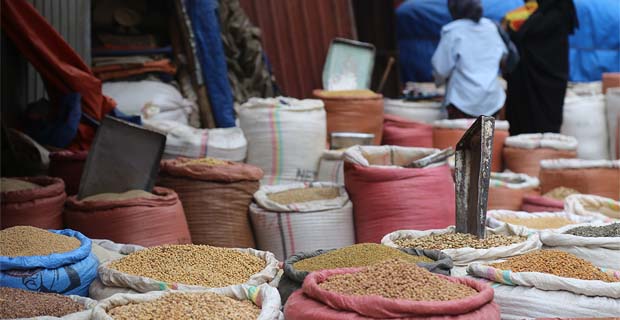
View From Arada | May 11,2024
Jun 5 , 2021
By Shewangezaw Seyoum
ShewangezawSeyoum is a consultant that works at the Industrial Parks Development Corporation. Views expressed here do not reflect that of the institution. He can be reached at swsm02@yahoo.com.
It is no secret that inflation has been inflicting pain on Ethiopians. Rising food prices have especially contributed to the swelling cost of living with dire consequences for low-income urban households and families in rural households that can not entirely rely on subsistence farming.
Against this backdrop, there is currently a puzzling phenomenon on the price of certain agricultural products. The price of essential items such as onion has collapsed so much so that it is even being discarded in the open in some parts of the country. At the same time, according to the authorities, at a 20pc year-on-year average, it is hammering consumers in nearly all goods and services.
This is surprising as inflation was not a pressing problem before 2004. Back then, the volume of agricultural produce increased thanks to a liberalisation impetus which gave rise to the expansion of the agricultural area that was cultivated. Agricultural produce went up similarly. There was also a favourable aid environment that helped keep inflation at bay. But from 2005 on, inflation has become the million Birr question demanding an urgent answer.
For one, inflation has got to do with deeply rooted government financing of deficits. Indeed, in the aftermath of the 2005 disputed election, donors protested by reducing the amount of aid and later changing the modality of its delivery from budget support to public services. This prompted the government to shift the means of financing the budget deficit from external to heavy central bank borrowing and non-bank sources. Hence, it led to the monetisation of the deficits, which led to a lot of money chasing after a few goods.
But, that is not all. In fact, explaining inflation in Ethiopia is a daunting enterprise. That is because there are many reasons for its occurrence. If that is not difficult enough, some are responsible for its onset and others just for exacerbating it. Still, some other factors determining inflation are coming and going while a few have stayed for long.
The recent inflationary process was dominated by pressure arising mainly from food items, including cereals that are the staples for a large number of people in Ethiopia. Many hypotheses have been offered to explain the reasons for these increases, including shortfalls in supply relative to population growth and breakdowns in markets caused by security problems.
However, none alone appear to explain the puzzle. If it were the case, we would have seen abating inflation. The government has already been taking measures aimed at addressing these gaps. These include importing and distributing wheat and edible oil at subsidised prices and even price controls through administrative measures.
The observation of collapsing price on certain items, like onions, is likely symptomatic of a larger problem in agricultural markets and marketing. Contrary to what some hold – that they function relatively well – in reality, they do not. They punish those trying to take advantage of price increases in one year by falling too low in the following. These are not an exception to vegetables, either. In the early 2000s, farmers increased cereal output initially, but prices of those items collapsed likewise in the coming year.
Increasing agricultural production is essential to improving food availability and farm household incomes. But, it should be understood that it is just one piece of the puzzle. Specific interventions that correct how the market works should also be included. Agricultural advisory services as well need to include agricultural marketing programmes among their responsibilities. For this, it is necessary to revise the curriculum of development agents that work alongside farmers. Neither is the role played by food processing, rural industrialisation, improved warehousing and modern storage a small matter.
PUBLISHED ON
Jun 05,2021 [ VOL
22 , NO
1101]


View From Arada | May 11,2024

Fortune News | Oct 03,2020

News Analysis | Mar 04,2023

Radar | Aug 08,2020

Editorial | May 13,2023

Commentaries | Jun 15,2024

Radar |

Editorial | Dec 19,2021

Commentaries | Jul 10,2020

Fortune News | Nov 21,2018

My Opinion | 131508 Views | Aug 14,2021

My Opinion | 127863 Views | Aug 21,2021

My Opinion | 125842 Views | Sep 10,2021

My Opinion | 123472 Views | Aug 07,2021

Dec 22 , 2024 . By TIZITA SHEWAFERAW
Charged with transforming colossal state-owned enterprises into modern and competitiv...

Aug 18 , 2024 . By AKSAH ITALO
Although predictable Yonas Zerihun's job in the ride-hailing service is not immune to...

Jul 28 , 2024 . By TIZITA SHEWAFERAW
Unhabitual, perhaps too many, Samuel Gebreyohannes, 38, used to occasionally enjoy a couple of beers at breakfast. However, he recently swit...

Jul 13 , 2024 . By AKSAH ITALO
Investors who rely on tractors, trucks, and field vehicles for commuting, transporting commodities, and f...

Jun 28 , 2025
Meseret Damtie, the assertive auditor general, has never been shy about naming names...

Jun 21 , 2025
A well-worn adage says, “Budget is not destiny, but it is direction.” Examining t...

Jun 14 , 2025
Yet again, the Horn of Africa is bracing for trouble. A region already frayed by wars...

Jun 7 , 2025
Few promises shine brighter in Addis Abeba than the pledge of a roof for every family...

Jun 29 , 2025
Addis Abeba's first rains have coincided with a sweeping rise in private school tuition, prompting the city's education...

Jun 29 , 2025 . By BEZAWIT HULUAGER
Central Bank Governor Mamo Mihretu claimed a bold reconfiguration of monetary policy...

Jun 29 , 2025 . By BEZAWIT HULUAGER
The federal government is betting on a sweeping overhaul of the driver licensing regi...

Jun 29 , 2025 . By NAHOM AYELE
Gadaa Bank has listed 1.2 million shares on the Ethiopian Securities Exchange (ESX),...